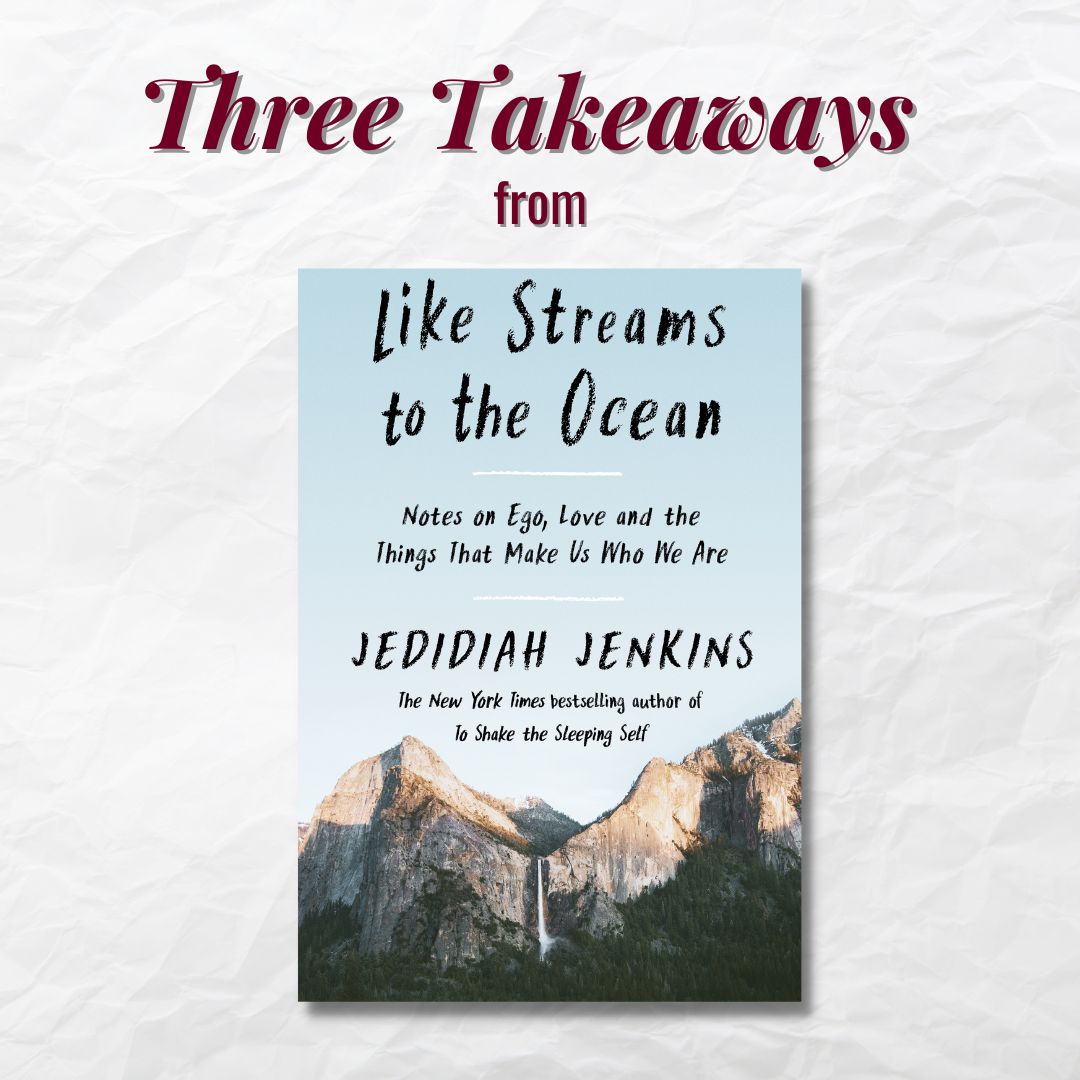Read this book if you have weathered some storms. I think this is for people particularly coming out of their twenties and been through some shit; those of us now at an age with a certain level of detachment and self-compassion. Some people may call that lack of ambition. I think it is becoming comfortable with who you are and are becoming. I honestly don’t know if I would have appreciated this book as much as I do now if I had read it five or more years ago.
Here are my Three Takeaways on Jedidiah Jenkins’ Like Streams To The Ocean:
1. The most meaningful experiences are not always permanent.

Remember that as you grow and change, others do, too. Everyone has the chance to learn about and reinvent themselves throughout their lifetimes. We change our clothes, our minds, our jobs, our friend groups, and our homes. The transitory element of every action and decision is what makes them valuable. I have experienced amazing relationships and friendships that ended. Some were deliberate. Some were due to extenuating circumstances. But they taught me so much about myself, about others, and the complexities of human relations.
You can fall in love with the sober wisdom that humans change and factors arise that are beyond the calculations of anyone.
As a creature of habit, I hate the very idea of impermanence. But I also oddly find it liberating: it means the low points will end. Impermanence is most frightening when we are in love. We worry about abandonment. We fear aloneness. But aloneness is not always loneliness—we often forget that we are our own best friends, too. All we can do is say, “Thank you for being here.”
Jenkins writes:
Why can’t you fall in love and discover it wasn’t right and move on while thanking the relationship for what it was? Love doesn’t seem to allow this, because it trades in absolutes. In forevers. That is what falling in love is, the endless planning and dreaming, the holding of the beloved with the pulsing hope that this holding will extend beyond the horizon.
2. Your life doesn’t have to be spectacular, it just has to be yours.

Plenty of people in their 20s and 30s, myself included, are or have been paralyzed by perfection. I wasted too much time trying to chase accomplishments worthy of aspirations. That is not the same as building a life that is true to who I am. I once aspired to be an elite scientist and drove myself into insanity trying to get that degree. Accepting where I excelled, what I enjoyed, and developing those skills gave me freedom. It also gave me permission to like myself, not some fantasy version I thought was worthy of acceptance.
It’s okay if you are not the best of the best. It is okay if you do not change the world. It is okay if you do not become a millionaire. This isn’t about a lack of vision or ambition. It is about reflecting on who you truly are, not what the world demands you become.
In the chapter on Work, Jenkins shares this impactful truth from one of his dear friends:
Your generation has an idolatry of magnitude. You think if you don’t change the world, or reject the world, or make the most money, or give away the most money, or reach the most fame, or throw everything out, or master everything, you have failed. It is an obsession with extremes.
3. Authenticity will triumph over any mandate or expectation.
Jenkins does not have a chapter dedicated to religion in his book but does touch on God and Christianity throughout it. I think we all live our lives professing our values and beliefs to understand the world. Some of us extrapolate and mold these from experiences, culture, relationships, communities, or religions. Along the way, we encounter people or events that challenge what and how we perceive and understand. I think it takes a lot of courage to acknowledge that and to reinvent yourself—an upgrading of equipment to better function and make sense of life as you go along. Sometimes what used to help us get to where we want to go can be the very things that get in the way.
most Christians know I’m not exactly one of them…I’ve never felt closer to God. I’ve never felt so real, so true. I don’t lie to God anymore. I don’t use faith as a social scorecard. I know you want me to say something different, something clearer, something more certain, but I’d rather tell the truth.
I struggled a lot with trying to force-fit my feelings and values about social issues into religion. I felt conflicted, fractioned; I didn’t know who I was. That made it difficult to trust myself, others, and God, too. I realized that even within communities and religions, we struggle to get past professing. I think the real work comes from grappling with the truth with yourself. Sometimes it’s difficult to distinguish your voice from others’ when you are deeply ingrained in a community. Actualizing our values is, I suspect, the most liberating way to live. It is how we live our lives on our own terms. As Jenkins says:
Actions are the real signifiers of internal conviction.
Closing remarks
This book floored me with its piercing candor and insights about life and growing up. I really enjoyed the chapters on ego, friendship, work, and love.
I finished it feeling nostalgic, reminiscent, and excited to keep getting older, all at the same time. I think part of what makes this book so striking to me is that it is authored by a Christian gay man. He shed off the ways of Christian church culture and has finally reached a place of self-acceptance that guides his worldview and ability to really live. He is so relatable to me, as an ex-Christian (my personal appraisal) and writer. I finished this book thinking I would also like to write with the same precision and authenticity as Jenkins.
Will you be adding this to your TBR? If you’ve read this book, share your thoughts below!
If you enjoyed this post, check out other books I’ve covered here.

